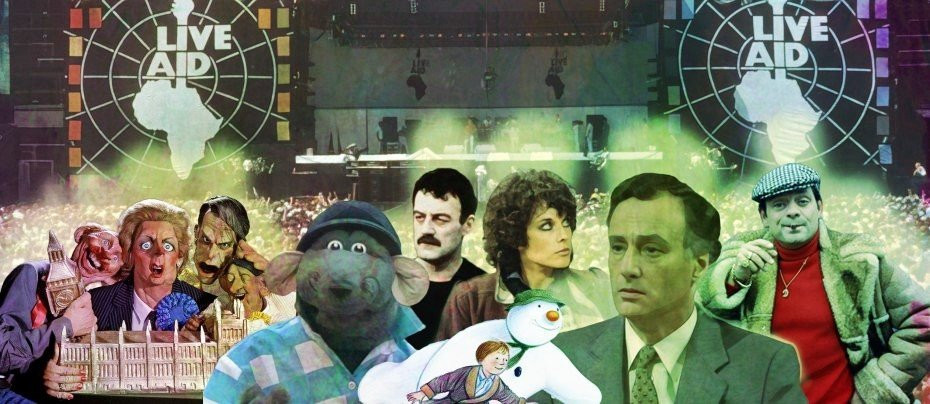
That TV Decade - The 1980s
Remembered by Laurence Marcus and Reeva Charles
The 1980s began in controversial style for British television when ATV's drama documentary Death of a Princess caused a political storm. The Saudi Government responded in anger about the story of a young princess who was executed (by shooting) along with her lover (who was beheaded) for adultery upon her reported confession. The fictitious nation in which the drama was set was called "Arabia", which some viewers unsurprisingly took to mean Saudi Arabia. The story was based on a real-life event even though the name of the princess was never said. As a result, the British ambassador to Riyadh was asked to leave the country, restrictions were placed on the issuing of visas to British businessmen, Saudi Arabia, along with Lebanon, banned British Airways' Concorde from its airspace and British export orders began to be cancelled. It was only at that point that British Foreign Secretary Lord Carrington said he found the film, "deeply offensive" and he "wished it had never been shown." As Neil Diamond said in the opening line to his 1979 song Forever in Blue Jeans, "money talks…"
Closer to home, the first major event in the UK of the 1980s, the Royal Wedding between HRH The Prince of Wales and Lady Diana Spencer in July 1981, was sure to keep the coffers coming. The royal occasion was watched by a television audience in excess of 500 million viewers worldwide with pictures being supplied by ITV and the BBC.
Millions watched in disbelief as news reports and the world mourned John Lennon's death in December 1980. The much-loved writer, vocalist and former Beatle was shot dead by a lunatic outside his apartment building in New York City.
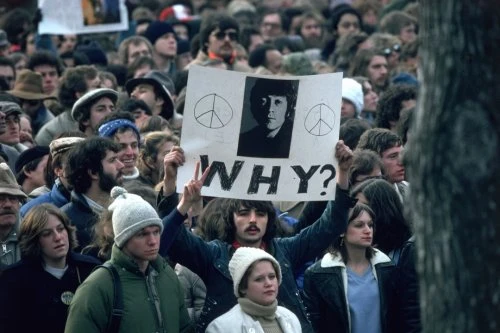
The following year, viewers in the UK were glued to the screens again as British troops set off to claim back the Malvinas following Argentina's invasion and occupation of the Falkland Islands. Reporting of the war was censored at the time and very little of the frontline fighting on the islands was captured on film.
Viewers watched in their millions once more as the troops returned home victorious. The BBC received criticism from the UK Government for being too 'even handed' in its coverage of British and Argentinian forces and questions were asked in Parliament. 7 years later the Conservative Government were incensed again when Thames Television broadcast Death on the Rock, an edition of the current affairs series This Week. The programme examined the killing of three Provisional IRA members in Gibraltar and presented evidence that the trio were shot without warning and with their hands up in surrender. Prime Minister Margaret Thatcher all but called the show treasonous, her intense disapproval and criticism, aimed specifically at Thames Television, led to the 1990 Broadcasting Act in which Thames eventually lost its franchise and the following decade saw what many people believed was a 'dumbing down' of British television.
Long before that, British TV was envied by many and held in reverent regard around the globe. On 2 November 1982, Channel 4 Television was launched as Britain's second independent TV channel. It was established as a wholly owned subsidiary of the IBA, bringing a new dimension in investment by financing films made for television, which also received cinema and overseas releases. This fulfilled its mandate to 'encourage innovation and experiment'. The channel was funded by a subscription levied on the ITV companies, which sold advertising time on the channel in their respective regions. Additionally, the Welsh Fourth Channel Authority, Sianel Pedwar Cymru (SC4), was established to provide Welsh language programming.
Breakfast Time became British television's first national breakfast TV programme. It was broadcast from 17 January 1983, two weeks before ITV's morning programme launch, even though the Independent Television Authority (IBA) had announced as early as 24 January 1980 that it would offer a national licence for breakfast broadcasting. Eight applications were received and on 28 December that year, the IBA announced that it had awarded the breakfast franchise to TV-am. The initial launch date was set for June 1983, to avoid clashing with the launch of Channel 4.
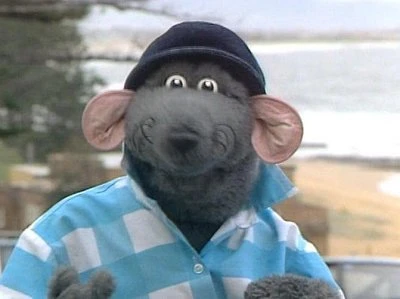
Whereas the BBC's Breakfast Time offered a lightweight programme, TV-am, spearheaded by the so-called Famous Five who were not only lined up as presenters on the station, but were also shareholders: Michael Parkinson, David Frost, Angela Rippon, Anna Ford and Robert Kee, focused on a highbrow approach. It lost viewers from day 2, with audiences preferring the BBC's less formal approach and continued its decline with only Michael Parkinson's Saturday morning edition drawing in a respectable audience. A boardroom coup ensued on 18 March and on 1 April the programme introduced a puppet! Roland Rat was launched by children's editor Anne Wood to give kids entertainment during the Easter holidays. The puppet was generally regarded as TV-am's saviour, being described as "the only rat to join a sinking ship". It indicated a clear change in presenting format and the public responded positively. After a couple of months on TV-am, the programme, along with the rat, took the audience viewing figures from 100,000 to 1.8 million.
Back in 1979 the first wave of personal computers had appeared and in 1980 the UK Government ordered a report into how this new technology could create new industries, new jobs, new export opportunities and new wealth, to be headed by an advisory panel led by Lord Hunt of Tamworth. The Inquiry into Cable Expansion and Broadcasting Policy of 1982 paved the way for a Cable Television Authority. January 1984 saw the launch of the first commercial satellite channel in the UK. In its first year, Sky Channel exceeded its original target by reaching 2.8 million equipped homes in Europe and 100,000 in Britain.
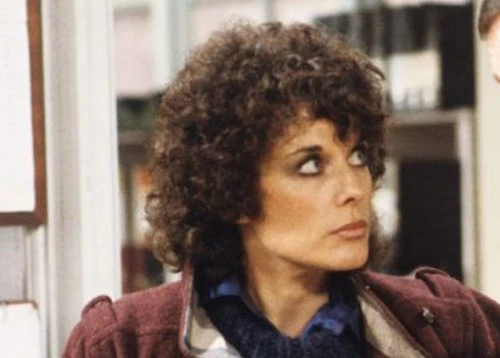
Despite the birth of cable television it was still the terrestrial channels that held audiences captive. Programmes that launched in the first year of the new decade included Cribb, a Victorian police series which made a star of Alan Dobie, whilst Bob Hoskins came to the public's notice in Flickers, a series about the early days of the British cinema. Trevor Preston's Fox was about a family on the wrong side of the law whilst the law itself was given a new hero as Jill Gascoine flashed her warrant card as British TV's first leading lady detective in LWT's The Gentle Touch. This was followed very quickly by the BBC's Juliet Bravo with Inspector Jean Darblay (Stephanie Turner) taking charge at Hartley Police Station.
Ladykillers saw women in a different light. The seven hour-long episodes each featured a true life dramatization of murder cases where a woman was the perpetrator. There was also real-life crime of the unsolved type that the public were asked to help solve in Crimewatch UK before signing out with the advice "Don't have nightmares, do sleep well."
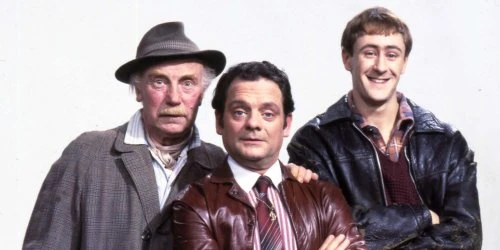
A Powerful seven-part drama series told the story of Oppenheimer, the father of the atomic bomb whilst the corridors of power in the UK were held up to hilarious ridicule in the satirical sitcom Yes, Minister. In Peckham, we were introduced to Derek (Del Boy), Rodney and Grandad Trotter in Only Fools and Horses, which would become one of the country's all-time favourite sitcoms.
There were some disasters, such as Triangle, a sea-borne soap opera, but there were also masterpieces such as Boys from the Blackstuff, Alan Bleasdale’s black comedy which spoke for millions of British unemployed with the plea "Gi' us a job." In 1982, Brookside became a twice weekly serial that attempted to challenge the superiority of Coronation Street, but it would be another few years before EastEnders became Corrie's main rival.
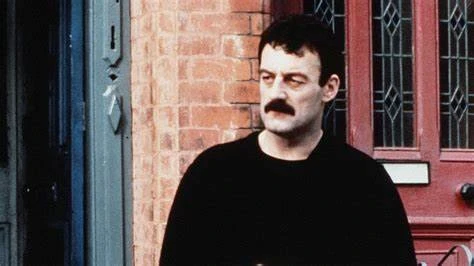
The Tube was an alternative rock magazine show which captured a respectable audience, whilst the madcap DJ Kenny Everett introduced some of the leading artists of the day alongside his own off-the-wall lunacy in his 'video show' as 'video' was fast becoming the by-word in the field of entertainment. Having launched towards the end of the 1970s, Home Video Cassette recorders only accounted for one in seven homes. By the end of the 1980s over 70% of the country were familiar with pause, rewind and fast forward as two distinct formats (VHS and Betamax), vied for superiority in a burgeoning market that allowed us to record and keep our favourite programmes, which was just as well because as we were keeping them, both the ITV and the BBC were systematically dumping them. But that’s another story.
The other by-word was IT. The first mainstream home computer in the UK to capture the public's imagination was launched in 1982. Clive Sinclair's Spectrum was an affordable range which sold more than 5 million units worldwide. In May 1983, licences were granted to Cellnet and Vodafone to provide national cellular radio networks in the UK. The first mobile phones were large and cumbersome and not very cheap, making them affordable to a select few - mainly 'yuppies', another term that appeared in the 1980s to describe middle classes in their 20s or 30s with a disposable income (ask Del Boy, he’ll tell you about them).
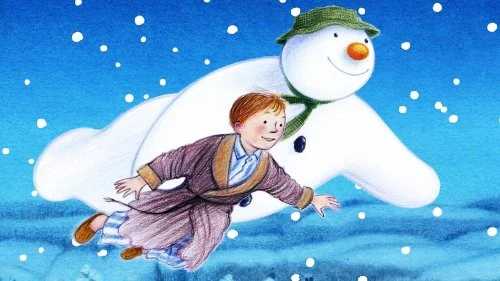
For children and families there was the ultimate Christmas story The Snowman, a delightful 25-minute animated film that didn't leave a dry eye in the house by its end, and for toddlers there was Postman Pat, Fireman Sam and Thomas and Friends.
The 1980s also produced some critically acclaimed dramas such as Tenko, The Singing Detective and Edge of Darkness as well as international bestsellers like The Flame Trees of Thika, Brideshead Revisited and The Jewel in the Crown, confirming to our American cousins that as well as being edgy the British could still be 'oh so quaint'.
Fashion-wise, it is reasonably safe to say that the 1980s did not distinguish itself; the cacophony of styles was highly-entertaining but hardly haute-couture as people strutted around in the defining looks of the Eighties - these included the floppy shirts and scarves of the 'New Romantics', the big hair and padded-shoulder Dynasty look, and the ripped jeans and white stilettoes of the newly-emerging 'Essex Girl'.
Carrying on from the punk theme of the 1970s and before that - the new spirit of freedom in the 1960s, the traditional sense of deference towards the establishment was now breaking down in new ways. The strong politics of this decade inspired new, irreverent and alternative comedy. The trend for political-tinged comedy continued with popular TV shows Spitting Image and Saturday Live, presented by Ben Elton, who also wrote or co-wrote some of the most popular sitcoms of this time including The Young Ones, Blackadder and Filthy Rich & Catflap.
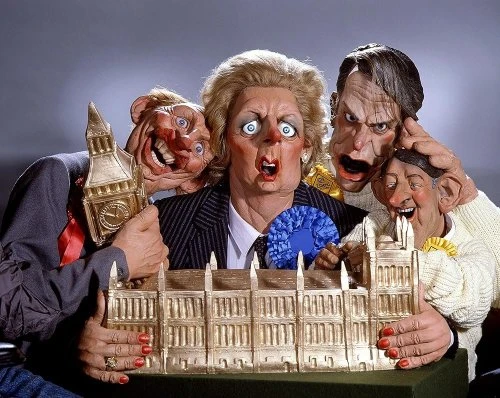
There was also an explosion in alternative stand-up comedians such as Alexi Sayle and new comedy clubs which made a break away from mainstream comedy and one-liner jokes. Meanwhile people were entertained and gripped in equal measure with a series of new inventions, both bizarre and addictive. On the game front, 1980 saw the introduction of the Pac-Man arcade game while from 1981 people all over the world twiddled their speedy fingers confounded by the unique and colourful Rubik's Cube.
By the end of the decade no respectable desk was without its own personal computer. Other new technology which amazed included the shiny Compact Discs which were commercially launched and distributed by Philips and Sony from 1982. This was the decade of global musical giants: we thrilled to Michael Jackson, took pride in Irish stadium rockers U2 and vogued with Madonna. Above all though, the defining musical event of the 80s was the Bob Geldof-inspired charity Live Aid event of 1985 watched by 1.9 billion people across 150 countries.
The 1980s in Great Britain saw a symphony of neon lights, rebellious fashion, and historic TV moments. It was a decade where yuppies strutted in their power suits, Walkmans blasted out our favourite tunes and shoulder pads reached the heavens. We cheered for royal weddings, mourned legendary musicians, and watched groundbreaking TV. It was a time of vibrant contradictions, where tech innovation met quirky pop culture and the traditional collided with the avant-garde, creating a uniquely unforgettable era.
Published on October 14th, 2024. Laurence Marcus & Reeva Charles.

